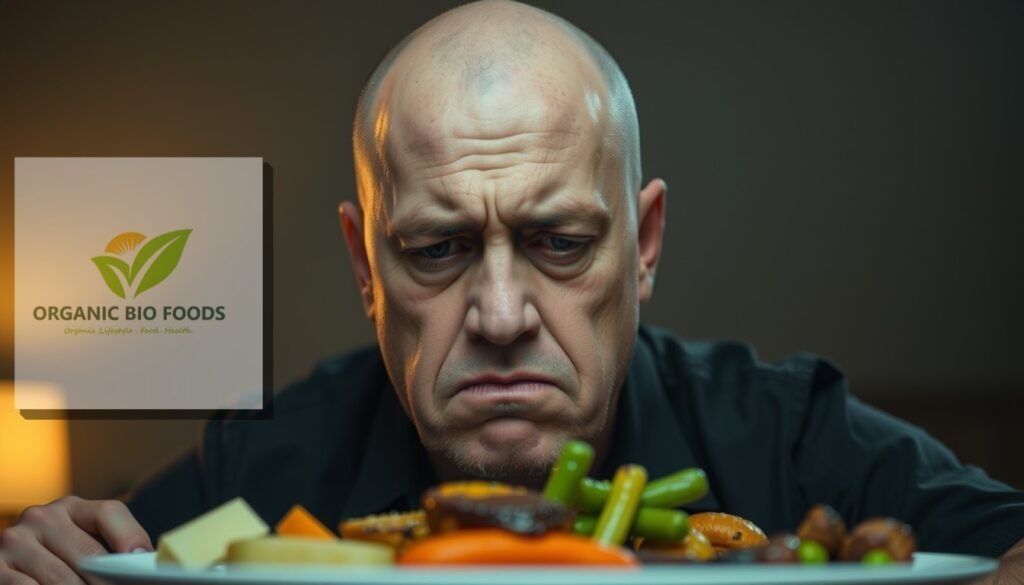Hair loss can be a stressful and frustrating experience, and while factors like genetics, stress, and hormones play a role, your diet can also have a big impact. Some foods, when consumed regularly, might actually be causing or worsening hair loss without you even realizing it! We combed the web looking for foods that could be contributing to hair loss, and we have come up with five common foods that could lead to hair loss and give you practical tips on how to possibly reverse the damage.
1. Artificial Sweeteners
Artificial sweeteners, especially aspartame, are often found in diet sodas and sugar-free snacks. Studies suggest that aspartame may damage hair follicles and contribute to hair loss in some individuals.
How to Reverse It:
Opt for natural sweeteners like honey, maple syrup, or stevia. Avoid consuming products with aspartame and check food labels carefully. Eating more antioxidant-rich foods like berries can help reverse damage caused by free radicals, which may affect hair health.
2. Fish High in Mercury
Certain fish like swordfish, mackerel, and tuna contain high levels of mercury, which has been linked to hair loss. Mercury toxicity can weaken the hair follicles and disrupt normal hair growth.
How to Reverse It:
Switch to fish that are lower in mercury, such as salmon, sardines, or trout. These fish are also rich in omega-3 fatty acids, which help promote healthy hair growth. You can also take a fish oil supplement to boost your intake of these essential fats.
3. High-Sodium Foods
Excessive sodium consumption, commonly found in processed snacks, canned soups, and instant noodles, can lead to water retention and scalp dehydration. This, in turn, can weaken hair strands and contribute to hair loss.
How to Reverse It:
Reduce sodium intake by opting for fresh foods rather than processed ones. Also, stay hydrated and incorporate potassium-rich foods like bananas and spinach to balance sodium levels and keep your hair healthy.
4. Low-Protein Diets
Hair is primarily made of a protein called keratin. A diet low in protein can deprive your body of the essential building blocks needed to produce healthy hair. This can result in hair becoming brittle, thin, and more prone to falling out.
How to Reverse It:
Incorporate more lean proteins like chicken, turkey, eggs, tofu, and beans into your diet. Protein-rich foods supply the amino acids your body needs to grow and maintain strong, healthy hair.
5. Excess Alcohol
Alcohol dehydrates the body, which can also dehydrate your hair and scalp, leading to hair thinning and breakage. Excessive alcohol consumption can deplete essential nutrients like zinc, folic acid, and vitamin C, all of which are critical for hair health.
How to Reverse It:
Limit alcohol intake and ensure you stay hydrated by drinking plenty of water. Add zinc-rich foods like pumpkin seeds and chickpeas to your diet to replenish depleted nutrients.
How to Reverse Hair Loss with a Healthier Diet
Now that you know which foods might be contributing to hair loss, here are some ways to reverse the damage by making better food choices:
- Add More Protein: Hair needs protein to grow. Make sure your diet includes plenty of lean proteins like eggs, chicken, turkey, and plant-based sources like lentils and quinoa.
- Incorporate Omega-3 Fatty Acids: Foods like salmon, walnuts, and flaxseeds are rich in omega-3s, which nourish the scalp and promote hair growth.
- Eat Vitamin-Rich Foods: Vitamins like biotin (found in eggs and nuts) and vitamin E (found in spinach and sunflower seeds) support hair health. Also, make sure you’re getting enough vitamin D, which plays a key role in the hair growth cycle.
- Stay Hydrated: Drinking plenty of water helps keep your scalp hydrated and ensures that nutrients reach your hair follicles.
- Boost Antioxidant Intake: Foods rich in antioxidants, like berries and leafy greens, help combat oxidative stress, which can damage hair follicles and lead to hair loss.
On a Final Note
Diet plays a significant role in the health of your hair. Avoiding certain foods like those high in sugar, trans fats, and mercury, and instead opting for nutrient-dense, hair-friendly foods can make a big difference in preventing hair loss. Combine these dietary changes with proper hydration and a balanced intake of essential vitamins and minerals to support hair growth and restore thinning hair. By making small but impactful changes to your diet, you can take charge of your hair health and avoid the pitfalls of hair loss caused by poor eating habits.








